GEDDES AS POLYMATH
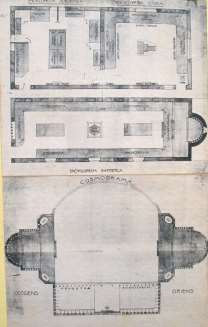
The “drama” was a term used by Geddes to describe the dynamic relationship between society and the environment. In this plan for an “Index Museum” the spectator would proceed through the galleries devoted to academic and empirical knowledge, the Encyclopacdiae Academica and Civica, towards the synthesis of this basic information. There is, however, a higher or more complete understanding of the world to be gained in the later sections which reveal the complex play of different forces on experience. “The advancing sciences are coming to realise their manifold connections, their profound and intimate unity. For what is the aim of science, and whither the increasing sweep of its generalisations of energy, life and evolution, if not towards an even fuller presentment of the Universe as Cosmic Drama?”
HUMAN BIOLOGY
Geddes’ scientific work ranged over Botany, Biology and Zoology, but his contribution to research in these disciplines was restricted to the early part of his career. The after effects of his temporary blindness in Mexico probably ruled out his use of a microscope, an essential tool for research, and from then onwards his approach was primarily speculative. His books on Biology are impressive because of their breadth rather than their detailed analysis. By choosing to study under Huxley, Darwin’s greatest advocate in the debate over evolution, Geddes was aligning himself with the most vital and influential ideas of the period — ideas which had ramifications far beyond the field of science alone, raising questions about our whole conception of the world. Geddes had already begun to develop Darwin’s views on cell theory concerning the relationship between an organism and its environment, when he became aware of the ideas of Frederic Le Play. The French sociologist’s model “Lieu, Travail, Famille” had an analogy in the botanist’s environment, function and organism. Geddes adapted this in his translation producing his own “Place, Work, Folk” as a model to emphasise the dynamic quality of all living things but particularly the link between a social group and its surroundings through work. This pattern, evident in the simplest and the most complex, he described as “Human Biology”.
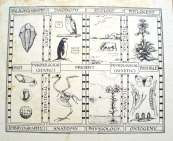
Human Biology 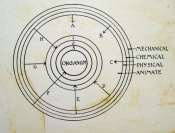
Human Biology 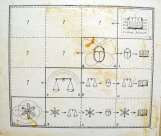
Human Biology 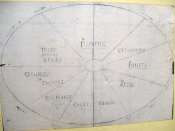
Human Biology 
Human Biology
THINKING MACHINES
When in Mexico on a scientific grant to do research on fossil dinosaurs Geddes went temporarily blind. It was during this period that he invented his famous “Thinking Machines” to organise material for his lectures.
